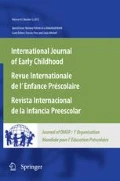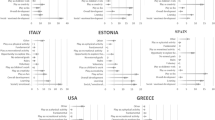Abstract
Play, and especially free play, offers a unique opportunity for children to act with agency. Yet the regulated and routinized structure of early childhood education and care settings, impedes children’s agentic action which is limited by adult-imposed rules. The present cross-cultural study aims to explore the extent to which Early Childhood Education and Care (ECEC) systems in seven countries are enabling children to be agentic and provide opportunities for children’s agency development during play. Specifically, founded on the rationale that in the context of an ECEC setting the notion of agency is interconnected with the notion of freedom, the present study aims at exploring through the responses of 187 early childhood educators’ from seven countries, children’s prerogative to choose how, where and with whom to play, which resources to use in their play, how much time to spend on play and the extent to which adults’ rules limit children’s opportunities to exercise agency and control. In addition, the study aims at exploring if and how educators’ and children’s characteristics affect the opportunities for agentic action. Results highlight that although children’s autonomy and their right to participate in shaping their experiences in the ECEC setting are valued and acknowledged across countries, their agentic action is not equally supported in all seven countries. Specifically, although ECEC systems in some of the countries are characterized by an ethos of agency, in the majority of them children are not viewed as real co-constructors of their play experiences.

Similar content being viewed by others
Notes
In the context of the present study, as preschool-aged children are defined the children from birth to their enrollment in the primary school.
As discussed in detail in Rentzou et al. (2019), play is an elusive concept and there is an abundance of definitions. In the present study, free play is defined as: 1) intrinsically motivated; 2) controlled by the players; 3) concerned with process rather than product; 4) non literal; 5) free of externally imposed rules; and 6) characterized by the active engagement of the players (Rubin, Fein and Vandenberg, 1983).
For an overview of the ECEC system in each of the participating countries see Rentzou et al. (2019)
References
Akyol, T. (2020). Teachers decide because they are adults: The views of Turkish preschoolers about participation. European Early Childhood Education Research Journal, 28(5), 659–674. https://doi.org/10.1080/1350293X.2020.1817237
Akyol, T., & Erdem, H. (2021). Childrens participation from the perspective of teachers. Journal of Pedagogical Research, 5(1), 188–202. https://doi.org/10.33902/JPR.2021167549
Bermejo, R., & Blázquez, T. (2016). El juego infantil y su metodología. Editorial Síntesis.
Comunidad de Madrid. (2008). Decreto 17/2008, de 6 de marzo, del Consejo de Gobierno, por el que se desarrollan para la comunidad de Madrid las enseñanzas de la Educación Infantil. Boletín Oficial de la Comunidad de Madrid, 61, 6–15. http://www.bocm.es/boletin/CM_Boletin_BOCM/2008/03/12/06100.pdf.
Creswell, J. (2013). Qualitative inquiry & research design: Choosing among five approaches. Sage.
Degotardi, S. (2013). “I think – I can”: Acknowledging and promoting agency during educator-infant play. In: O.F., Lillemyr, S. Dockett, and B. Perry, (Eds.). Varied Perspectives of play and learning: Theory and research on early years’ education (p.p. 75–90). Charlotte, NC: Information Age Publishing.
Enz, B., & Christie, J.F. (1993). Teacher play interaction styles and their impact on children’s oral language and literacy play. Paper presented at the annual meeting of the national reading conference. Charleston SC, December 1–4 1993.
Fisher, K. R., Hirsh-Pasek, K., Golinkoff, R. B., & Gryfe, S. G. (2008). Conceptual split? Parents’ and experts’ perceptions of play in the 21st century. Journal of Applied Developmental Psychology, 29(4), 305–316.
Göl-Güven, M. (2017). Play and flow: Children’s culture and adults’ role. Journal of Early Childhood Studies, 1(2), 194–208.
Government Gazette 4249. (2017). Πρότυπος κανονισμός λειτουργίας δημοτικών παιδικών και βρεφονηπιακών σταθμών [Model regulation for the operation of municipal child and infant/child centers]. Athens: Joint Ministerial Decision 41087 – Government Gazette 4249/B/05.12.2017.
Hunter, T., & Walsh, G. (2014). From policy to practice?: The reality of play in primary school classes in Northern Ireland. International Journal of Early Years Education, 22(1), 19–36.
Kindergarten Curriculum. (2014). 1o μέρος. Παιδαγωγικό πλαίσιο και αρχές προγράμματος σπουδών νηπιαγωγείου [Part 1. Pedagogical framework and principles of the kindergarten curriculum]. Retrieved October 19, 2021. https://www.esos.gr/sites/default/files/articles-legacy/1947_1o_meros_pps_nipiagogeioy.pdf.
Kindergarten Curriculum. (2019). 2ο μέρος. Μαθησιακές περιοχές [Part 2. Learning domains]. Retrieved October 19, 2021 http://iep.edu.gr/images/IEP/EPISTIMONIKI_YPIRESIA/Epist_Monades/A_Kyklos/Proshol_Agogi_nea/2019/meros_2_paidagogiko_plaisio.pdf.
Koçyiğit, S., & Başara Baydilek, N. (2015). Okulöncesi dönem çocuklarının oyun algılarının incelenmesi. [Examination of children’s play perceptions in early childhood years]. YY Eğitim Fakültesi Dergisi, 12(1), 1–28.
Koolieelse lasteasutuse riiklik õppekava. (2008). [National Curriculum for Preschool Child Care Institutions]. https://www.riigiteataja.ee/akt/13351772?leiaKehtiv.
Kragh-Müller, G. & Ringsmose, C. (2015). Pædagogisk kvalitet i store og små daginstitutioner (Educational Quality in Big and small Childcare Facilities). Research Report, Aarhus University, Denmark.
Kragh-Müller, G., & Isbell, R. (2011). Children’s perspectives on their everyday lives in child care in two cultures: Denmark and the United States. Early Childhood Education Journal, 39, 17–27.
Kragh-Muller, G., Slutsky, R., Rentzou, K., Gol Guven, M., Tuul, M., & Paz-Albo, J. (2022). Preschool teachers’ role in children's play in preschool across 8 countries. Manuscript in preparation..
Loizou, E., & Avgitidou, S. (2014). The Greek-Cypriot early childhood educational reform: Introducing play as a participatory learning process and as children’s right. Early Child Development and Care, 184(12), 1884–1901. https://doi.org/10.1080/03004430.2014.892482
López, I. (2010). El juego en la educación infantil y primaria. AUTODIDACTA. Revista de la Educación en Extradura, 19–37. http://educacioninicial.mx/wp-content/uploads/2017/11/JuegoEIP.pdf.
Markström, A. M., & Halldén, G. (2009). Children’s strategies for agency in preschool. Children & Society, 23, 112–122.
McInnes, K. (2019). Playful learning in the early years – through the eyes of children. Education 3–13, 47(7), 796–805.
Ministerio de Educación y Formación Profesional. (2022). Real Decreto 95/2022, de 1 de febrero, por el que se establece la ordenación y las enseñanzas mínimas de la Educación Infantil. Boletín Oficial del Estado, 28, 14561–14595. https://www.boe.es/eli/es/rd/2022/02/01/95.
Ministry of National Education (MoNE). (2013). Preschool education program. Ministry of National Education Publishing.
Mwatha, W. W., Muema, M. J., & Munyoki, M. J. (2017). Availability and use of play materials, and their influence on social and emotional development of pre-school children in Kyangwithya zone, Kitui county. International Journal of Asian Social Science, 7(4), 278–283.
Nilsen, T. R. (2021). Pedagogical intentions or practical considerations when facilitating children’s play? Teachers’ beliefs about the availability of play materials in the indoor ECEC environment. International Journal of Child Care and Education Policy, 15(1), 1–16.
Ministry of Education and Culture (2020). Preschool education curriculum (3–6 years old). Nicosia: Ministry of Education and Culture. Retrieved October 19, 2021 http://archeia.moec.gov.cy/sd/270/dee_nip_proscholiki_ekpaidefsi.pdf.
Rentzou, K., Slutsky, R., Tuul, M., Gol – Guven, M., Kragh-Müller, G., Foerch, D.F.,& Paz-Albo, J. (2019). Preschool teachers’ conceptualizations and uses of play across eight countries. Early Childhood Education Journal, 47(1), 1–14.
Rentzou, K., & Kontou, E. (2021). Exploring children’s views and perceptions about their play and adults’ role in it. Presentation at the 2nd Panhellenic Conference: “The educational play and art in education and culture". October 29–31, 2021, online.
Ringsmose, C., & Kragh-Müller, G. (2013). How positive childhood experiences promote children’s development of democratic skills: A reflection from Denmark. Childhood Education, 89(4), 224–233.
Rubin, K. H., Fein, G. G., & Vandenberg, B. (1983). Play. In E. M. Hetherington (Ed.), Handbook of child psychology (Vol. 4, pp. 693–774). Wiley.
Sairanen, H., & Kumpulainen, K. (2014). A visual narrative inquiry into children’s sense of agency in preschool and first grade. International Journal of Educational Psychology, 3(2), 143–176.
Scott, C. (2019). Children’s agency: Exploring early childhood educator-child interactions. PhD Thesis. Deakin University. Retrieved September 12, 2021, from https://dro.deakin.edu.au/eserv/DU:30147274/scott-childrensagency-2020.pdf.
Scott, C., Nolan, A., & Kilderry, A. (2020). Facilitating children’s agency in early childhood education and care. In A. Kilderry & B. Raban (Eds.), Strong foundations: Evidence informing practice in early childhood education. ACER Press. https://doi.org/10.37517/978-1-74286-555-3_9
Sirkko, R., Kyrönlampi, T., & Puroila, A. M. (2019). Children’s agency: Opportunities and constraints. International Journal of Early Childhood, 51, 283–300.
Strauss, A., & Corbin, J. (1994). Grounded theory methodology: An overview. In N. Denzin & Y. Lincoln (Eds.), Handbook of qualitative research (pp. 273–285). Sage Publications.
Svinth, L. (2012). Children’s collaborative encounters in preschool analysed in a socio-cultural learning perspective. In L. Svinth & C. Ringsmose (Eds.), Learning and development in preschool (pp. 15–59). Danish Psychological Publisher.
Tanakidou, M., & Avgitidou, S. (2016). Supporting children’s perspectives in free play: An educational intervention! Dialogoi Theory and Praxis in Education, 2, 52–77. https://doi.org/10.12681/dial.10542
Touhill, L. (2013). Promoting independence and agency. National Quality Standard, Professional Learning Program. E-newsletter, Number 64. Retrieved September 5, 2021 from https://www.bcci.edu.au/images/childcare/NQS_PLP_E-Newsletter_No64.pdf.
Tuul, M. (2017). Lasteaiaõpetajate arusaamad õppekavadest ja laste õppimisest ning hinnang õpetaja pedagoogilisele tegevusele lapsekeskse kasvatuse kontekstis. [Preschool teachers' views on curricula and children's learning and the assessment of the teachers' teaching activity in the context of child-centred education]. Doctoral dissertation. Tallinn: Tallinna Ülikool.
United Nations General Assembly (1989). Convention on the Rights of the Child. New York, NY: United Nations.
Wood, E. A. (2014). Free choice and free play in early childhood education: Troubling the discourse. International Journal of Early Years Education, 22(1), 4–18. https://doi.org/10.1080/09669760.2013.830562
Author information
Authors and Affiliations
Corresponding author
Additional information
Publisher's Note
Springer Nature remains neutral with regard to jurisdictional claims in published maps and institutional affiliations.
Rights and permissions
Springer Nature or its licensor holds exclusive rights to this article under a publishing agreement with the author(s) or other rightsholder(s); author self-archiving of the accepted manuscript version of this article is solely governed by the terms of such publishing agreement and applicable law.
About this article
Cite this article
Rentzou, K., Slutsky, R., Gol–Guven, M. et al. A Cross-Cultural Study on Factors Affecting Children’s Agentic Action in Their Play. IJEC 55, 89–112 (2023). https://doi.org/10.1007/s13158-022-00335-w
Accepted:
Published:
Issue Date:
DOI: https://doi.org/10.1007/s13158-022-00335-w



